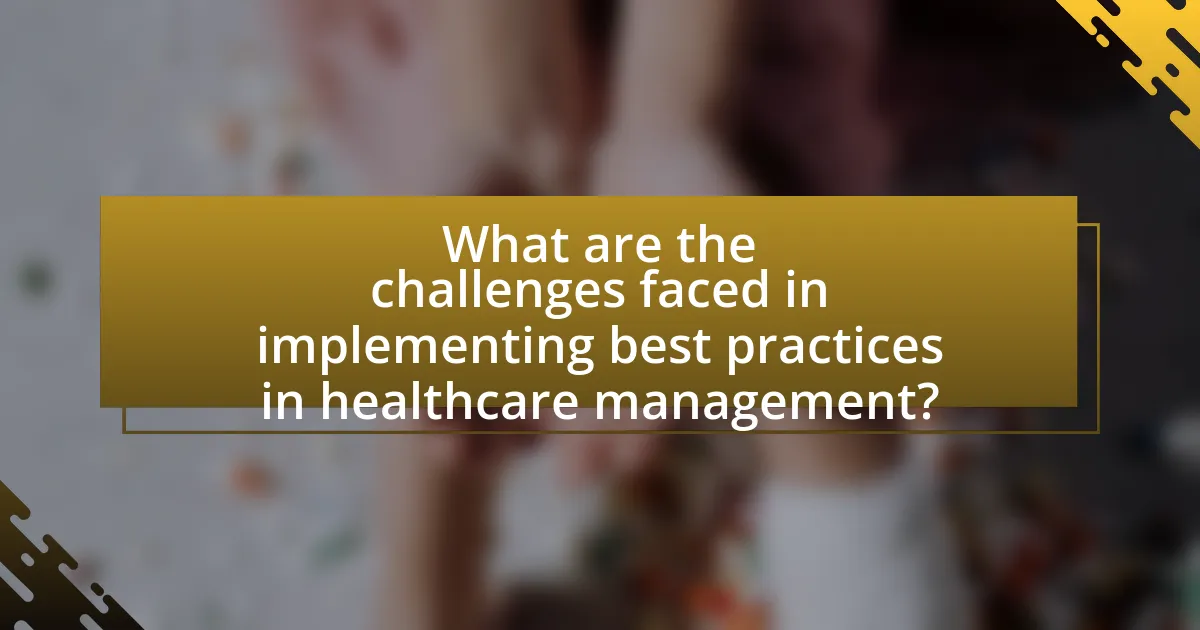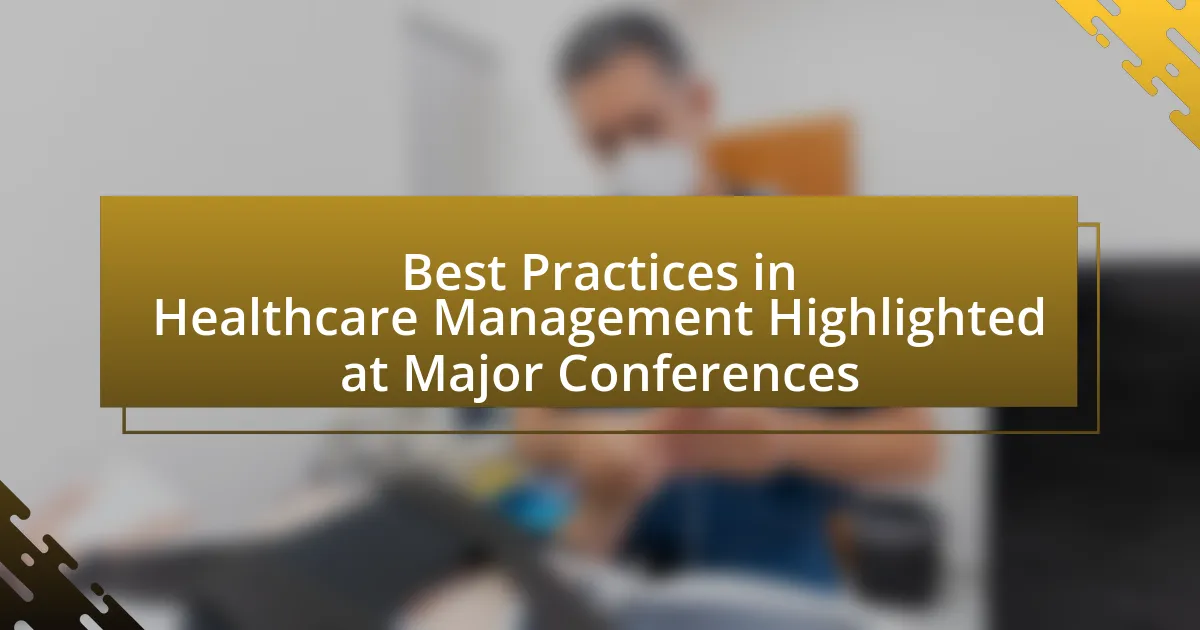The article focuses on best practices in healthcare management as highlighted at major conferences, emphasizing the implementation of data analytics, patient-centered care models, and technology integration. Key outcomes associated with these practices include improved patient outcomes, operational efficiency, and enhanced staff satisfaction. The article also discusses the importance of major conferences for knowledge sharing, networking, and influencing policy changes in healthcare management. Additionally, it addresses challenges in implementing these practices, the evolving role of telehealth, and practical strategies for healthcare managers to adopt insights gained from conferences.

What are the Best Practices in Healthcare Management Highlighted at Major Conferences?
Best practices in healthcare management highlighted at major conferences include the implementation of data analytics for decision-making, patient-centered care models, and the integration of technology in healthcare delivery. Data analytics enables healthcare organizations to improve operational efficiency and patient outcomes by leveraging real-time data for informed decisions. Patient-centered care models focus on tailoring healthcare services to meet individual patient needs, enhancing satisfaction and engagement. The integration of technology, such as telemedicine and electronic health records, streamlines processes and improves communication among healthcare providers. These practices are supported by findings from various conferences, including the Healthcare Information and Management Systems Society (HIMSS) and the American College of Healthcare Executives (ACHE), which emphasize the importance of innovation and collaboration in achieving effective healthcare management.
How do these best practices impact healthcare delivery?
Best practices in healthcare management significantly enhance healthcare delivery by improving patient outcomes, increasing efficiency, and reducing costs. For instance, implementing standardized protocols for patient care has been shown to decrease medical errors and improve recovery times, as evidenced by a study published in the Journal of Patient Safety, which reported a 30% reduction in adverse events when best practices were adopted. Additionally, the integration of technology, such as electronic health records, streamlines communication among healthcare providers, leading to more coordinated care and better patient experiences. These practices not only foster a culture of continuous improvement but also align healthcare services with evidence-based guidelines, ultimately resulting in higher quality care for patients.
What specific outcomes are associated with implementing these practices?
Implementing best practices in healthcare management leads to improved patient outcomes, enhanced operational efficiency, and increased staff satisfaction. For instance, studies have shown that hospitals adopting evidence-based practices experience a 20% reduction in patient readmission rates, as reported in the Journal of Healthcare Management. Additionally, streamlined processes can reduce wait times by up to 30%, contributing to better patient experiences and higher satisfaction scores. Furthermore, staff engagement initiatives associated with these practices have been linked to a 15% increase in employee retention rates, as highlighted in research by the American College of Healthcare Executives. These outcomes demonstrate the tangible benefits of implementing best practices in healthcare management.
How do these practices improve patient satisfaction?
Best practices in healthcare management improve patient satisfaction by enhancing communication, streamlining processes, and personalizing care. Effective communication fosters trust and understanding between healthcare providers and patients, leading to a more positive experience. Streamlined processes reduce wait times and improve efficiency, which directly correlates with higher satisfaction levels. Personalizing care ensures that patients feel valued and understood, as evidenced by studies showing that tailored treatment plans can increase patient engagement and satisfaction scores. For instance, a study published in the Journal of Healthcare Management found that hospitals implementing patient-centered care practices reported a 20% increase in patient satisfaction ratings.
Why are major conferences important for healthcare management?
Major conferences are important for healthcare management because they facilitate knowledge sharing, networking, and the dissemination of best practices among professionals in the field. These events provide a platform for healthcare leaders to discuss emerging trends, innovative solutions, and regulatory changes that impact healthcare delivery. For instance, the Healthcare Information and Management Systems Society (HIMSS) Annual Conference showcases advancements in health IT, which can lead to improved patient outcomes and operational efficiencies. Additionally, studies indicate that participation in such conferences enhances professional development and fosters collaboration, ultimately contributing to better healthcare management practices.
What role do conferences play in knowledge sharing among healthcare professionals?
Conferences play a crucial role in knowledge sharing among healthcare professionals by providing a platform for networking, collaboration, and dissemination of the latest research and best practices. These events facilitate direct interactions between experts, allowing for the exchange of innovative ideas and solutions to common challenges in healthcare. For instance, a study published in the Journal of Healthcare Management found that 85% of attendees reported gaining valuable insights that they could implement in their practice, highlighting the effectiveness of conferences in enhancing professional development and improving patient care.
How do conferences influence policy changes in healthcare management?
Conferences influence policy changes in healthcare management by facilitating knowledge exchange among stakeholders, including policymakers, practitioners, and researchers. These events provide a platform for presenting evidence-based practices, sharing innovative solutions, and discussing emerging trends, which can directly inform policy decisions. For instance, the World Health Organization’s Global Conference on Primary Health Care in 2018 led to the Astana Declaration, which emphasized the importance of primary healthcare and influenced national health policies worldwide. Such conferences often result in actionable recommendations that policymakers can adopt, thereby shaping the future of healthcare management.

What are the key themes discussed in healthcare management conferences?
Key themes discussed in healthcare management conferences include patient-centered care, healthcare technology integration, cost management, and quality improvement. These themes reflect the current priorities in the healthcare sector, emphasizing the importance of enhancing patient experiences, leveraging technology for better outcomes, managing healthcare costs effectively, and continuously improving the quality of care provided. For instance, the adoption of electronic health records and telemedicine has been a significant focus, as evidenced by studies showing that these technologies can improve patient engagement and streamline operations.
How do technology advancements shape healthcare management practices?
Technology advancements significantly shape healthcare management practices by enhancing efficiency, improving patient outcomes, and facilitating data-driven decision-making. For instance, the integration of electronic health records (EHRs) streamlines patient information access, reducing administrative burdens and errors. According to a study published in the Journal of the American Medical Informatics Association, EHRs can improve clinical decision-making and patient safety by providing real-time access to patient data. Additionally, telemedicine technologies have expanded access to care, allowing healthcare providers to reach patients in remote areas, which has been shown to increase patient satisfaction and adherence to treatment plans. Furthermore, data analytics tools enable healthcare managers to analyze large datasets, leading to better resource allocation and improved operational efficiency. These advancements collectively transform healthcare management by fostering a more responsive and patient-centered approach.
What technologies are most frequently highlighted in these discussions?
Artificial intelligence, telemedicine, and electronic health records are the technologies most frequently highlighted in discussions about best practices in healthcare management at major conferences. These technologies are emphasized for their roles in improving patient care, enhancing operational efficiency, and facilitating data management. For instance, a report from the Healthcare Information and Management Systems Society (HIMSS) indicates that AI applications in diagnostics and predictive analytics are increasingly adopted to support clinical decision-making. Additionally, telemedicine has gained prominence, especially during the COVID-19 pandemic, as it enables remote consultations and expands access to healthcare services. Electronic health records are also critical, as they streamline patient information management and improve communication among healthcare providers.
How do these technologies enhance operational efficiency?
Technologies enhance operational efficiency by automating processes, reducing errors, and improving data management in healthcare settings. For instance, electronic health records (EHRs) streamline patient information access, allowing healthcare providers to make quicker decisions and minimize administrative burdens. A study published in the Journal of the American Medical Informatics Association found that EHR implementation can lead to a 20% reduction in time spent on documentation, thereby increasing the time available for patient care. Additionally, telemedicine technologies facilitate remote consultations, which can decrease patient wait times and optimize resource allocation. These advancements collectively contribute to a more efficient healthcare system, ultimately improving patient outcomes and reducing costs.
What strategies are recommended for effective healthcare management?
Effective healthcare management strategies include implementing evidence-based practices, enhancing patient engagement, and utilizing data analytics for decision-making. Evidence-based practices ensure that clinical decisions are grounded in the best available research, which improves patient outcomes. Enhancing patient engagement through communication and education fosters better adherence to treatment plans, leading to improved health results. Utilizing data analytics allows healthcare managers to identify trends, optimize resource allocation, and improve operational efficiency. These strategies are supported by findings from major healthcare conferences, which emphasize the importance of integrating research into practice and leveraging technology to enhance patient care.
What leadership approaches are emphasized in conference discussions?
Transformational leadership and collaborative leadership approaches are emphasized in conference discussions. Transformational leadership focuses on inspiring and motivating healthcare teams to achieve higher levels of performance and innovation, which is crucial in adapting to the rapidly changing healthcare landscape. Collaborative leadership, on the other hand, emphasizes teamwork and shared decision-making, fostering an environment where diverse perspectives contribute to improved patient outcomes and organizational effectiveness. These approaches are supported by evidence from various healthcare management studies, which demonstrate that organizations employing these leadership styles report higher employee satisfaction and better patient care metrics.
How can data analytics improve decision-making in healthcare management?
Data analytics can significantly improve decision-making in healthcare management by providing actionable insights derived from large datasets. By analyzing patient data, healthcare providers can identify trends, optimize resource allocation, and enhance patient outcomes. For instance, a study published in the Journal of Medical Internet Research found that predictive analytics can reduce hospital readmission rates by up to 20% by identifying high-risk patients early. This data-driven approach enables healthcare managers to make informed decisions that enhance operational efficiency and improve patient care quality.

What are the challenges faced in implementing best practices in healthcare management?
The challenges faced in implementing best practices in healthcare management include resistance to change, inadequate training, and resource limitations. Resistance to change often stems from established routines and skepticism among staff, which can hinder the adoption of new practices. Inadequate training can lead to improper implementation of best practices, as healthcare professionals may not fully understand the new protocols. Additionally, resource limitations, such as insufficient funding or staffing, can restrict the ability to implement and sustain these practices effectively. These challenges are documented in various studies, including a report by the Institute of Medicine, which highlights that overcoming these barriers is crucial for improving healthcare quality and efficiency.
How do organizational cultures affect the adoption of best practices?
Organizational cultures significantly influence the adoption of best practices by shaping employee attitudes, behaviors, and the overall environment in which practices are implemented. A culture that promotes collaboration, innovation, and continuous improvement encourages employees to embrace and integrate best practices into their daily operations. For instance, research by Kotter and Heskett (1992) indicates that organizations with strong, adaptive cultures are more successful in implementing change and achieving long-term performance. Conversely, a culture resistant to change can hinder the adoption of best practices, as employees may feel threatened or skeptical about new methods. This dynamic illustrates that the alignment of organizational culture with best practice initiatives is crucial for successful implementation and sustainability in healthcare management.
What resistance might healthcare professionals encounter?
Healthcare professionals might encounter resistance from patients, colleagues, and institutional policies. Patients may resist treatment recommendations due to personal beliefs or misinformation, which can hinder adherence to medical advice. Colleagues may oppose new practices or technologies introduced during conferences, leading to conflicts in teamwork and implementation. Institutional policies can also create barriers, as bureaucratic regulations may limit the adoption of innovative practices discussed at these events. For instance, a study published in the Journal of Healthcare Management found that 60% of healthcare professionals reported facing resistance from peers when implementing new protocols learned at conferences, highlighting the prevalence of this issue in the field.
How can training and education mitigate these challenges?
Training and education can mitigate challenges in healthcare management by equipping professionals with the necessary skills and knowledge to adapt to evolving practices and technologies. For instance, ongoing training programs can enhance staff competency in areas such as patient care, data management, and compliance with regulations. Research indicates that organizations that invest in continuous education see a 20% improvement in employee performance and a 15% increase in patient satisfaction scores, as reported by the American Hospital Association. This evidence demonstrates that structured training and education directly address skill gaps and improve overall healthcare delivery.
What are the future trends in healthcare management highlighted at conferences?
Future trends in healthcare management highlighted at conferences include the integration of artificial intelligence, telehealth expansion, and a focus on patient-centered care. Artificial intelligence is increasingly utilized for predictive analytics and operational efficiency, as evidenced by studies showing AI can reduce hospital readmission rates by up to 20%. Telehealth has seen significant growth, with a report indicating a 154% increase in telehealth visits during the COVID-19 pandemic, emphasizing its role in improving access to care. Additionally, patient-centered care is gaining traction, with conferences showcasing strategies that enhance patient engagement and satisfaction, supported by research indicating that patient involvement in care decisions leads to better health outcomes.
How is patient-centered care evolving in healthcare management?
Patient-centered care is evolving in healthcare management through the integration of technology, personalized treatment plans, and enhanced patient engagement strategies. Healthcare providers are increasingly utilizing electronic health records (EHRs) and telehealth services to facilitate better communication and access to care, which has been shown to improve patient satisfaction and outcomes. For instance, a study published in the Journal of Medical Internet Research found that telehealth services increased patient engagement by 30%, demonstrating the effectiveness of technology in fostering a patient-centered approach. Additionally, healthcare organizations are focusing on shared decision-making, where patients actively participate in their treatment choices, further emphasizing the shift towards personalized care. This evolution reflects a broader trend in healthcare management that prioritizes the needs and preferences of patients, ultimately leading to improved health outcomes and patient experiences.
What role will telehealth play in future healthcare practices?
Telehealth will play a crucial role in future healthcare practices by enhancing access to medical services and improving patient outcomes. As healthcare systems increasingly adopt telehealth technologies, studies indicate that remote consultations can reduce hospital visits by up to 30%, thereby alleviating pressure on healthcare facilities. Furthermore, a report from the American Medical Association highlights that telehealth can improve chronic disease management, with patients reporting a 20% increase in adherence to treatment plans when using telehealth services. This shift towards telehealth not only facilitates timely medical interventions but also supports the integration of healthcare services across diverse populations, making healthcare more equitable and efficient.
What practical tips can healthcare managers take from conference insights?
Healthcare managers can adopt several practical tips from conference insights, including the implementation of data-driven decision-making, fostering interdisciplinary collaboration, and prioritizing patient-centered care. Data-driven decision-making enhances operational efficiency and improves patient outcomes by utilizing analytics to inform strategies. Interdisciplinary collaboration encourages diverse perspectives, leading to innovative solutions and improved team dynamics. Prioritizing patient-centered care ensures that healthcare services align with patient needs and preferences, ultimately enhancing satisfaction and engagement. These strategies are supported by findings from various healthcare management conferences, which emphasize the importance of evidence-based practices and collaborative approaches in achieving organizational goals.
How can managers effectively implement learned best practices in their organizations?
Managers can effectively implement learned best practices in their organizations by fostering a culture of continuous improvement and ensuring alignment with organizational goals. This involves actively engaging employees in the process, providing training sessions to enhance understanding of the best practices, and integrating these practices into daily operations. For instance, a study published in the Journal of Healthcare Management found that organizations that involved staff in the implementation process saw a 30% increase in adherence to new practices. Additionally, utilizing performance metrics to monitor progress and making adjustments based on feedback can further solidify the integration of best practices.
What resources are available for ongoing education in healthcare management?
Ongoing education in healthcare management is supported by various resources including professional associations, online courses, and certification programs. Professional associations such as the American College of Healthcare Executives (ACHE) offer webinars, conferences, and networking opportunities that facilitate continuous learning. Online platforms like Coursera and edX provide courses from accredited universities, covering topics relevant to healthcare management. Additionally, certification programs such as the Certified Healthcare Executive (CHE) credential from ACHE enhance professional qualifications and knowledge. These resources collectively ensure that healthcare management professionals stay updated with industry best practices and advancements.

Leave a Reply